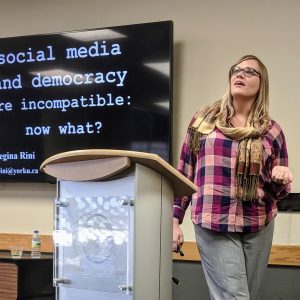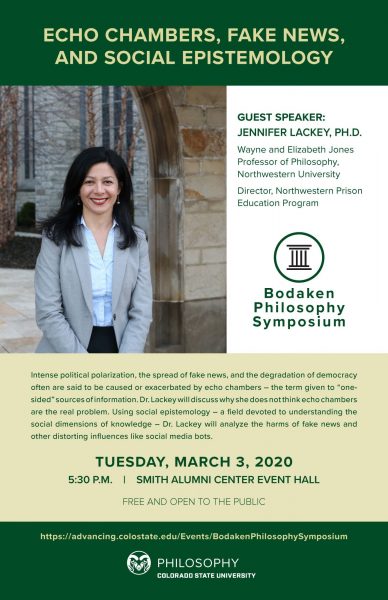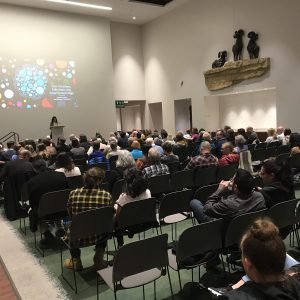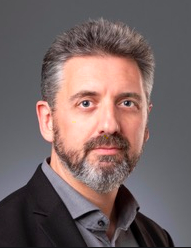The Bodaken Philosophy Symposium is a multi-year series of events sponsored by philosophy alumnus Bruce Bodaken. The Symposium encourages dialogue between scholars and the larger community on issues of both philosophical and social significance.
2019-2020: Living Together Online: Social Epistemology, Ethics, and the Internet

The philosophy department hosted two events this past academic year that relate to how we engage with one another and with technology on the internet. The purpose of choosing this theme was to investigate the interesting and timely questions that arise at the intersection of theories of knowledge and some of the ethical and social challenges that come up when billions of people communicate online, often using platforms that are privately run for profit, such as social media companies.
Bodaken Symposium Chair Moti Gorin explains the significance of this topic, “As the internet has grown, and as social media companies in particular have grown, we are now facing new challenges in the way that information—and, importantly, misinformation—is being generated, shared, and consumed.” Because the speed of technology and technological innovation moves so quickly, Gorin says that “we thought this would be a good time to pause and ‘think in slow motion,’” which is how philosopher John Campbell has characterized the activity of doing philosophy.

The fall Bodaken activities, held in mid-October, were arranged in a workshop format. The department hosted a dozen scholars from the US, Canada, and the UK who were all working on issues related to our digital lives. Gorin elaborates, “The workshop was envisioned as a place for philosophers and scholars working in related fields to get together and share their work on the year’s theme. The purpose was really to bring scholars together to do rigorous philosophy and to try to move the field forward in terms of researching scholarship.”
Presentations ranged in topic, including philosophical analyses of Twitter and accountability practices, online moderation, digital privacy, deepfakes, and the compatibility of democracy and social media given the prevalence of “bots” and the spread of fake news. Gorin thought this first workshop event was a “great success.” “The talks were well-attended, really stimulating, and everyone I spoke with told me how much they got out of attending. We made an effort to cover a range of topics so that everyone could learn something from everyone else. It was also a lot of fun.”

In early March, the department hosted the Bodaken spring lecturer Dr. Jennifer Lackey, Wayne and Elizabeth Jones Professor of Philosophy at Northwestern University and the Director of the Northwestern Prison Education Program. Lackey participated in an informal seminar with graduate students and faculty in addition to her large public lecture. The smaller event highlighted Lackey’s work in prisons and her passion for criminal justice reform. The discussion focused on the work in her recently published article, “False Confessions and Testimonial Injustice” (The Journal of Criminal Law & Criminology, Winter 2020). In addition to a fascinating analysis of the problems of truth and testimony, Lackey shared a plethora of real-life cases that spoke to the troubling state of the criminal justice system especially in regard to coerced confessions and the prevalence of plea deals.
Lackey’s public lecture, “Echo Chambers, Fake News, and Social Epistemology,” took a deep dive into the role of the internet and social media in promoting political polarization. Lackey spoke at length about the prevalence of echo chambers—single sources of news—and how they can easily amplify false information. She also discussed the increasing role of digital bots that can exponentially and successfully spread misinformation and bad content though social media platforms, such as Twitter. Gorin was pleased with the reception of Lackey’s work, “The audience seemed very engaged and the question-and-answer portion of the event was quite vibrant.”
2020-21: Environmental Ethics in the Anthropocene Epoch

This year’s Bodaken Symposium will focus on the two most pressing environmental problems in the world today: global climate change and mass species extinction. Our annual Bodaken spring lecture, scheduled for February 18, 2021, will be delivered by Stephen Gardiner, chair of the philosophy department at the University of Washington. Professor Gardiner is a leading writer on the ethics of climate change and author of A Perfect Moral Storm: the Ethical Tragedy of Climate Change. As in past years, the goal of the spring lecture is to bring the university community together around a philosophical (yet accessible) exploration of an important issue in public policy.
Our Bodaken Philosophy Workshop, originally scheduled for the fall, has been rescheduled for March 4-5, 2021. The workshop will bring together a dozen environmental philosophers from around the world who work on the topic of the ethics of extinction, including Clare Palmer (Texas A&M), Eileen Crist (Virginia Tech), Martin Drenthen (Radboud University) and Thom Van Dooren (University of Sydney). Papers from the workshop will be published in a special issue of the journal Philosophia guest edited by Philip Cafaro (CSU) and Ronald Sandler (Northeastern University). The goal of the workshop is to further rigorous ethical exploration of humanity’s relationships and responsibilities toward other species in a time of rapid biodiversity loss.